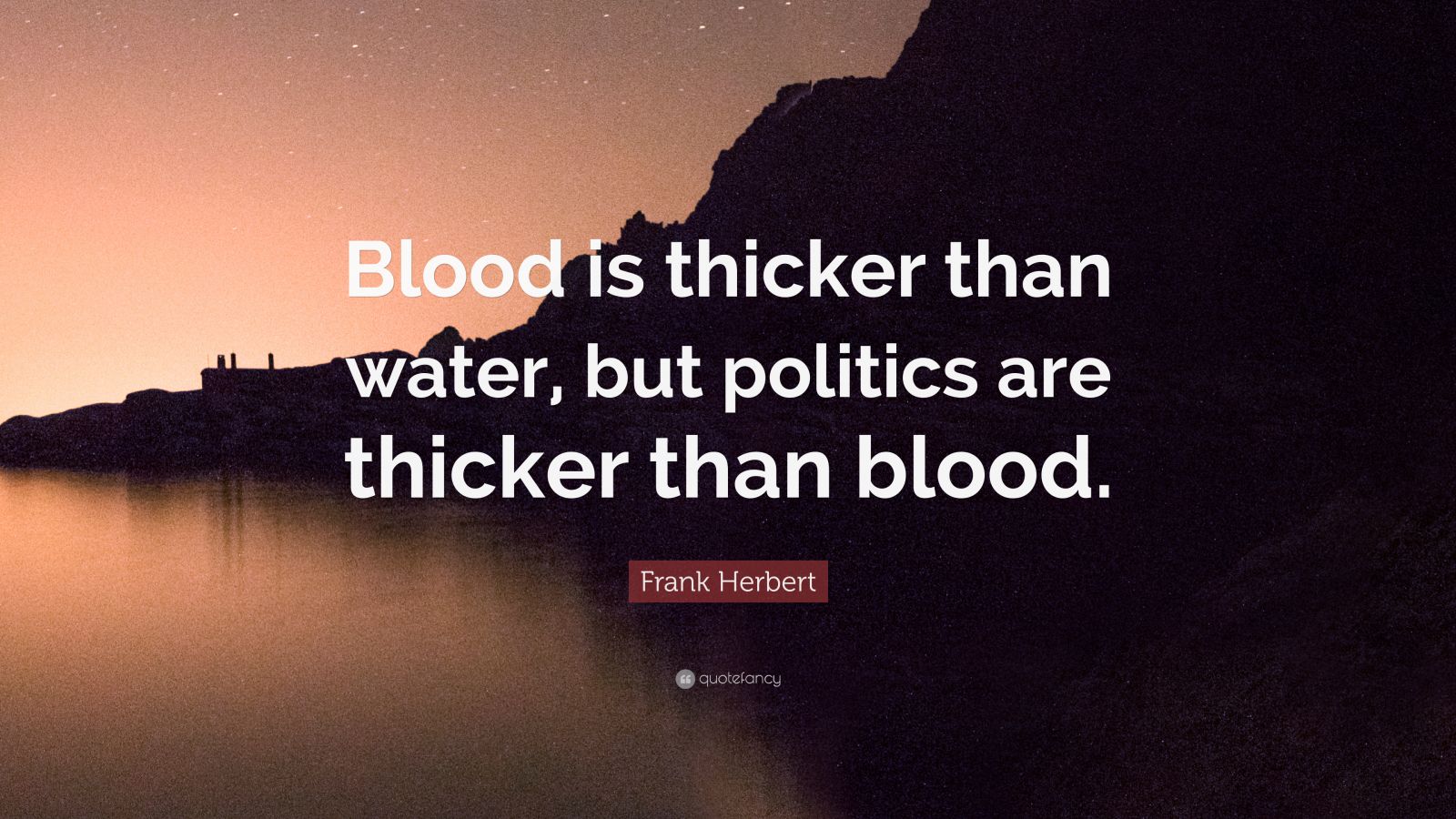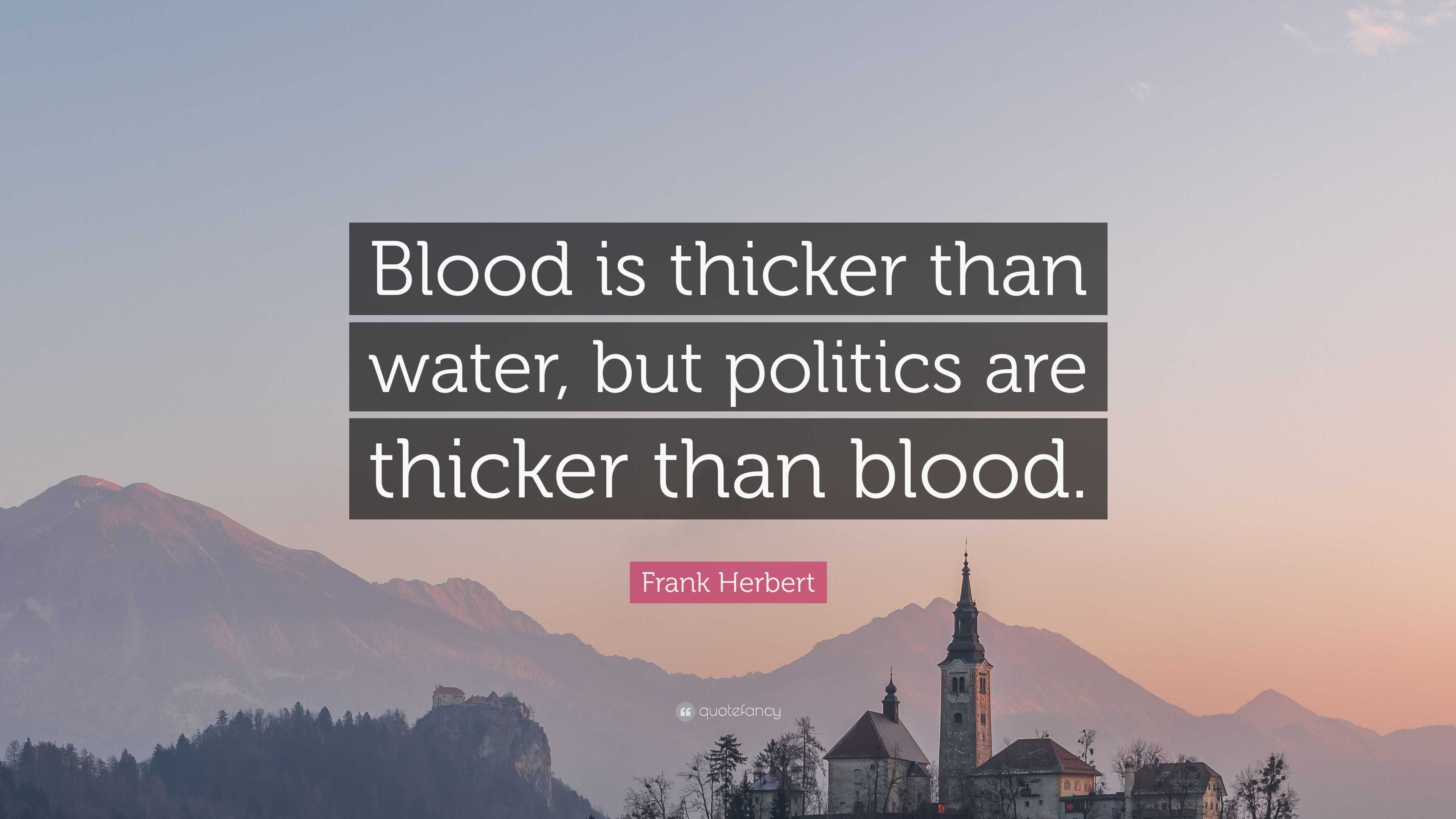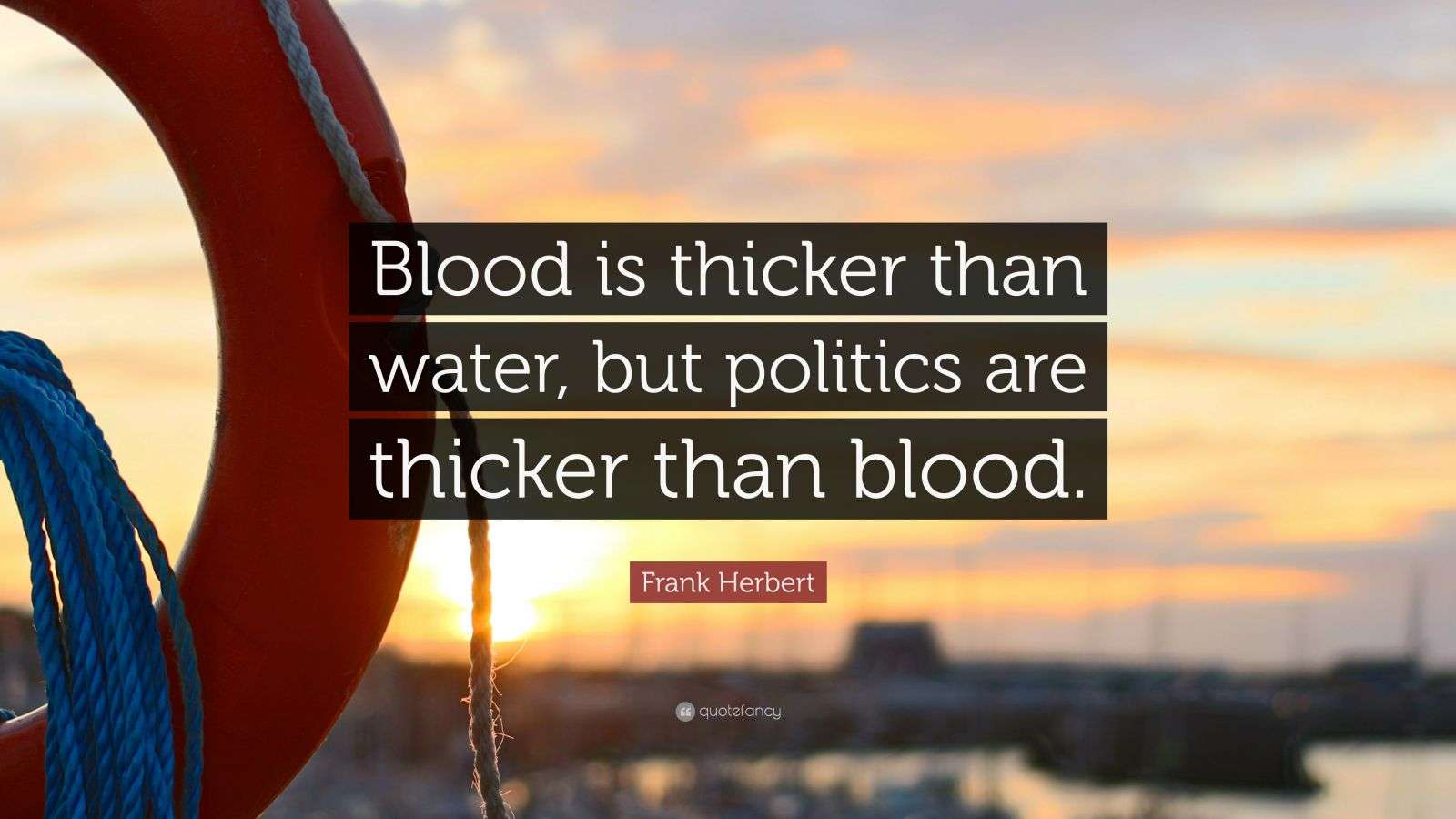Blood Is Thicker Than Water Full Quote: Exploring The Origins And Meaning
The phrase "blood is thicker than water" is a widely recognized expression that speaks to the deep bonds of family loyalty and connection. This saying has been passed down through generations, but its full quote and origins are often misunderstood. In this article, we will delve into the complete meaning and historical background of the phrase, uncovering its true essence and significance.
While the saying itself is simple, the full quote carries a much richer and more nuanced meaning. It is not merely about family ties but also about the values and commitments that define our relationships. Understanding the complete context of this phrase allows us to appreciate the cultural and historical significance it holds.
This article will explore the origins of the phrase, its evolution over time, and how it continues to resonate in modern society. By the end, you will have a comprehensive understanding of the full quote and its implications in various aspects of life.
- Is The Gametime App Legit A Comprehensive Guide To Trustworthiness Features And User Experience
- Is Miley Cyrus Married The Ultimate Guide To Her Love Life And Relationship Status
Table of Contents
- The Origin of "Blood is Thicker Than Water"
- The Full Quote: What Does It Really Mean?
- A Historical Perspective on the Phrase
- Common Misconceptions About the Saying
- Cultural Impact and Usage in Literature
- The Relevance of the Phrase in Modern Times
- Strengthening Family Bonds Through the Saying
- Psychological Insights on Familial Loyalty
- Legal Perspective on Familial Obligations
- Conclusion: Reflecting on the Timeless Wisdom
The Origin of "Blood is Thicker Than Water"
The phrase "blood is thicker than water" has a long and storied history. It dates back to ancient times, where it was used to emphasize the importance of familial ties over other relationships. The original saying can be traced to early Germanic and Middle Eastern cultures, where family loyalty was considered paramount.
In medieval Europe, the phrase gained popularity as a way to reinforce the bonds between family members, especially in times of conflict or hardship. The expression was often used in legal documents and treaties to signify the unbreakable nature of family connections.
Historical Roots and Cultural Significance
Interestingly, the phrase was not always used in its current form. Early variations of the saying were more focused on the idea of blood covenants, where blood was seen as a sacred bond that could not be broken by external forces. This concept was particularly significant in religious and cultural contexts.
- Who Is Lucas Adams Mom Unveiling The Life And Legacy Of A Remarkable Woman
- When Was Joe Biden Born A Comprehensive Look At His Birth Life And Legacy
- Blood covenants were common in ancient societies, symbolizing trust and commitment.
- The phrase evolved over time, adapting to changing social norms and values.
- Its meaning shifted from a literal interpretation to a more metaphorical understanding of family loyalty.
The Full Quote: What Does It Really Mean?
The full quote of "blood is thicker than water" is often misunderstood. While the saying itself is straightforward, its deeper meaning lies in the context in which it was originally used. The phrase suggests that family relationships are stronger and more enduring than any other type of bond.
Exploring the Metaphorical Meaning
At its core, the phrase is a metaphor for the unbreakable nature of familial ties. It implies that no matter the circumstances, family should always come first. However, this interpretation has been challenged in modern times, as people increasingly recognize the importance of other relationships, such as friendships and partnerships.
Recent studies have shown that while family bonds are important, they are not always the strongest or most meaningful relationships in a person's life. This has led to a reevaluation of the phrase and its relevance in contemporary society.
A Historical Perspective on the Phrase
To truly understand the phrase "blood is thicker than water," we must examine its historical context. From ancient civilizations to modern times, the saying has undergone significant transformations, reflecting the changing values and priorities of different eras.
Key Historical Developments
- In ancient Mesopotamia, blood covenants were used to seal alliances and establish trust between tribes.
- During the Middle Ages, the phrase was often used in legal documents to emphasize the importance of family loyalty.
- In the 19th century, the saying gained popularity in English-speaking countries, where it became a staple of literature and everyday speech.
These historical developments highlight the enduring nature of the phrase and its ability to adapt to changing cultural landscapes.
Common Misconceptions About the Saying
Despite its widespread use, there are several misconceptions about the phrase "blood is thicker than water." Many people believe that it promotes the idea that family relationships are always superior to other types of bonds, which is not necessarily true.
Challenging the Traditional Interpretation
Recent research has shown that the phrase was originally used in a more literal sense, referring to blood covenants rather than family ties. Over time, the meaning shifted to focus on familial loyalty, but this interpretation is not universally accepted.
Some experts argue that the phrase should be reevaluated in light of modern social norms, which place greater emphasis on individual choice and personal relationships. This perspective challenges the traditional view of family loyalty as the ultimate priority.
Cultural Impact and Usage in Literature
The phrase "blood is thicker than water" has had a significant impact on literature and popular culture. It has been used in countless novels, films, and television shows to explore themes of family loyalty and betrayal. Its enduring appeal lies in its ability to evoke strong emotions and provoke thought.
Examples in Literature
- William Shakespeare frequently used the phrase in his plays to explore complex family dynamics.
- Modern authors such as J.K. Rowling and Stephen King have incorporated the saying into their works, giving it new meaning in the context of contemporary storytelling.
These examples demonstrate the versatility of the phrase and its ability to resonate across different cultural and historical contexts.
The Relevance of the Phrase in Modern Times
In today's fast-paced world, the phrase "blood is thicker than water" continues to hold relevance. While family relationships remain important, they are no longer seen as the sole determinant of a person's identity or worth. Modern society values individuality and personal choice, leading to a more nuanced understanding of the phrase.
Adapting to Modern Values
As society evolves, so too does the meaning of the phrase. In a world where people are increasingly connected through technology and social media, the concept of family loyalty has expanded to include a wider range of relationships. This shift has led to a reevaluation of the phrase and its place in modern discourse.
Experts suggest that the phrase should be interpreted in a more flexible manner, allowing for a broader understanding of what constitutes a meaningful relationship. This approach acknowledges the diversity of human connections and the importance of personal choice in shaping one's life.
Strengthening Family Bonds Through the Saying
Despite the changing nature of relationships, the phrase "blood is thicker than water" remains a powerful reminder of the importance of family bonds. It encourages people to prioritize their relationships with loved ones and to seek meaningful connections in their lives.
Practical Tips for Strengthening Family Ties
- Communicate openly and honestly with family members to build trust and understanding.
- Set aside time for family activities and traditions to strengthen emotional connections.
- Practice forgiveness and empathy to resolve conflicts and maintain harmony within the family.
These strategies can help individuals cultivate stronger, more meaningful relationships with their families, aligning with the core message of the phrase.
Psychological Insights on Familial Loyalty
From a psychological perspective, the phrase "blood is thicker than water" reflects the deep-seated human need for connection and belonging. Studies have shown that strong family relationships contribute to better mental health and overall well-being.
Key Findings from Psychological Research
- People with strong family ties tend to experience lower levels of stress and anxiety.
- Family support is a key factor in resilience and coping with life's challenges.
- Emotional connections with family members promote a sense of identity and purpose.
These findings underscore the importance of nurturing family relationships and maintaining strong bonds with loved ones.
Legal Perspective on Familial Obligations
From a legal standpoint, the phrase "blood is thicker than water" highlights the obligations and responsibilities that come with family relationships. In many jurisdictions, family members are expected to provide support and care for one another, particularly in cases of illness or disability.
Legal Implications of Familial Loyalty
- Inheritance laws often prioritize family members over non-relatives, reflecting the importance of blood ties in legal contexts.
- Family courts frequently mediate disputes related to custody, support, and guardianship, emphasizing the role of family loyalty in resolving conflicts.
These legal frameworks reinforce the idea that family relationships carry significant weight in both personal and societal contexts.
Conclusion: Reflecting on the Timeless Wisdom
The phrase "blood is thicker than water" has endured for centuries, offering timeless wisdom about the importance of family loyalty and connection. While its meaning has evolved over time, the core message remains relevant in today's world. By understanding the full quote and its historical context, we can appreciate the depth and complexity of this saying.
We invite you to reflect on your own relationships and consider how the phrase applies to your life. Share your thoughts in the comments below, and explore other articles on our site for more insights into the power of family bonds and human connection.
- Ontario Mills Open Hours Your Ultimate Guide To Shopping And Entertainment
- What State Is Clt Airport In A Comprehensive Guide To Charlotte Douglas International Airport

Frank Herbert Quote “Blood is thicker than water, but politics are

Frank Herbert Quote “Blood is thicker than water, but politics are

Frank Herbert Quote “Blood is thicker than water, but politics are